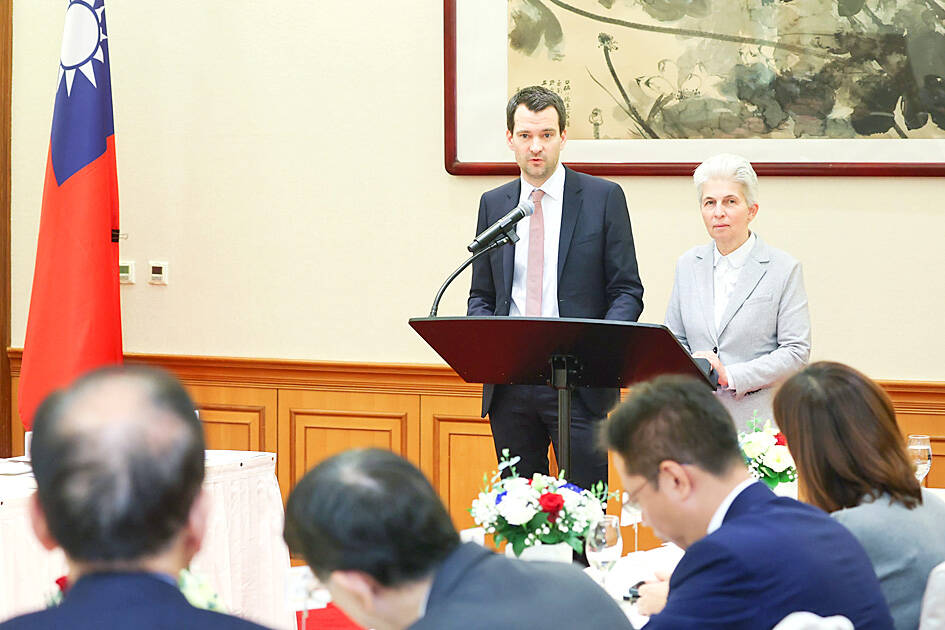A delegation of German Free Democratic Party (FDP) lawmakers led by German Bundestag Committee on Defense Chairwoman Marie-Agnes Strack-Zimmermann and party deputy chair Johannes Vogel arrived in Taiwan yesterday.
The visit is a gesture of German “solidarity” with Taiwan, they said.
Legislative Speaker You Si-kun (游錫堃) hosted a banquet to welcome the delegation.

Photo courtesy of the Taipei Photojournalist Society
“As a model of democracy against authoritarianism, Taiwan draws admiration from the world” because of its mature and stable democratic system,” Vogel said.
The FDP is a junior partner in Germany’s coalition government.
Vogel said that Taiwan’s peaceful and smooth transition to democracy was a “quite rare” event worthy of admiration.
The situation between Taiwan and China is complicated, and the FDP and the EU must support the “one China” policy, but the party is nonetheless supportive of Taiwan, he said.
Germany would like to send China a message that military intimidation is not acceptable, he said, adding that the trip is to “demonstrate Germany’s massive support for Taiwan.”
You said he was touched when the FDP in 2021 deleted mention of the “one China” policy from its election platform in an effort to support Taiwan.
Germany and the EU should engage with Taiwan more, he said.
You said he hopes that allies support Taiwan’s resistance against aggression and bullying, safeguard global peace and stability, and work to encourage China’s democratization.
German Minister of Education and Research Bettina Stark-Watzinger, also of the FDP, plans to visit Taipei in the spring, Agence France-Presse reported.
It would be the first visit by a member of the German Cabinet in 26 years.
The delegation is to meet with President Tsai Ing-wen (蔡英文) and other senior officials, the Ministry of Foreign Affairs said in a statement.
The members are scheduled to visit the Hsinchu Science Park and the National Human Rights Museum before departing on Thursday.
The Chinese Ministry of Foreign Affairs yesterday criticized the visit.
“The root of the Taiwan problem is precisely that of the law of the jungle — hegemonism, colonialism, militarism and nationalism. China suffered deeply from these behaviors throughout history,” Ministry of Foreign Affairs Wang Wenbin (汪文斌) told a news conference.
“Germany once experienced a profound and painful historical lesson in this regard,” he added.
Separately, a parliamentary delegation from Lithuania arrived in Taiwan yesterday morning.
Lithuanian Parliamentary Group for Relations with Taiwan vice chair Dovile Sakaliene on Sunday said on Facebook that Lithuania and Taiwan would discuss cybersecurity and geopolitical security challenges.
The invasion of Ukraine showed that the threats Lithuania and Taiwan face are real, and the two countries should “learn, unite, and act now,” she said.
Additional reporting by Lu Yi-hsuan

‘TAIWAN-FRIENDLY’: The last time the Web site fact sheet removed the lines on the US not supporting Taiwanese independence was during the Biden administration in 2022 The US Department of State has removed a statement on its Web site that it does not support Taiwanese independence, among changes that the Taiwanese government praised yesterday as supporting Taiwan. The Taiwan-US relations fact sheet, produced by the department’s Bureau of East Asian and Pacific Affairs, previously stated that the US opposes “any unilateral changes to the status quo from either side; we do not support Taiwan independence; and we expect cross-strait differences to be resolved by peaceful means.” In the updated version published on Thursday, the line stating that the US does not support Taiwanese independence had been removed. The updated

‘CORRECT IDENTIFICATION’: Beginning in May, Taiwanese married to Japanese can register their home country as Taiwan in their spouse’s family record, ‘Nikkei Asia’ said The government yesterday thanked Japan for revising rules that would allow Taiwanese nationals married to Japanese citizens to list their home country as “Taiwan” in the official family record database. At present, Taiwanese have to select “China.” Minister of Foreign Affairs Lin Chia-lung (林佳龍) said the new rule, set to be implemented in May, would now “correctly” identify Taiwanese in Japan and help protect their rights, the Ministry of Foreign Affairs said in a statement. The statement was released after Nikkei Asia reported the new policy earlier yesterday. The name and nationality of a non-Japanese person marrying a Japanese national is added to the

AT RISK: The council reiterated that people should seriously consider the necessity of visiting China, after Beijing passed 22 guidelines to punish ‘die-hard’ separatists The Mainland Affairs Council (MAC) has since Jan. 1 last year received 65 petitions regarding Taiwanese who were interrogated or detained in China, MAC Minister Chiu Chui-cheng (邱垂正) said yesterday. Fifty-two either went missing or had their personal freedoms restricted, with some put in criminal detention, while 13 were interrogated and temporarily detained, he said in a radio interview. On June 21 last year, China announced 22 guidelines to punish “die-hard Taiwanese independence separatists,” allowing Chinese courts to try people in absentia. The guidelines are uncivilized and inhumane, allowing Beijing to seize assets and issue the death penalty, with no regard for potential

‘UNITED FRONT’ FRONTS: Barring contact with Huaqiao and Jinan universities is needed to stop China targeting Taiwanese students, the education minister said Taiwan has blacklisted two Chinese universities from conducting academic exchange programs in the nation after reports that the institutes are arms of Beijing’s United Front Work Department, Minister of Education Cheng Ying-yao (鄭英耀) said in an exclusive interview with the Chinese-language Liberty Times (the Taipei Times’ sister paper) published yesterday. China’s Huaqiao University in Xiamen and Quanzhou, as well as Jinan University in Guangzhou, which have 600 and 1,500 Taiwanese on their rolls respectively, are under direct control of the Chinese government’s political warfare branch, Cheng said, citing reports by national security officials. A comprehensive ban on Taiwanese institutions collaborating or